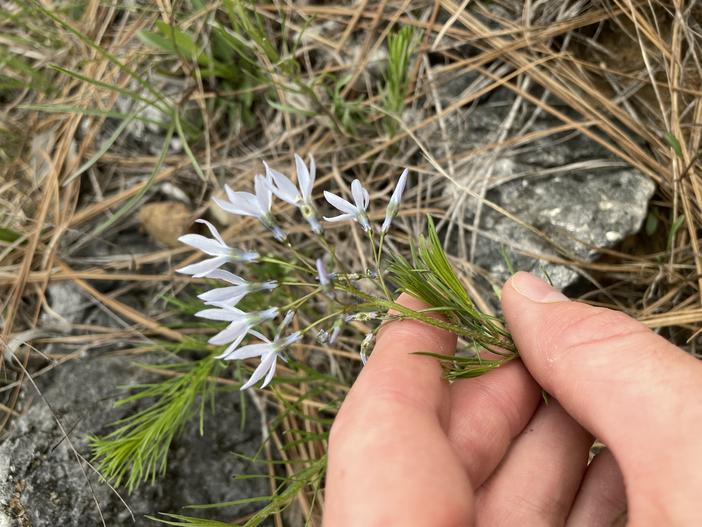Fringed Bluestar
(Amsonia ciliata var. filifolia)
Fringed Bluestar (Amsonia ciliata var. filifolia)
/
/

Noah Yawn
CC BY 4.0
Image By:
Noah Yawn
Recorded By:
Copyright:
CC BY 4.0
Copyright Notice:
Photo by: Noah Yawn | License Type: CC BY 4.0 | License URL: http://creativecommons.org/licenses/by/4.0/ | Occurence ID: https://www.gbif.org/occurrence/4516360539 | Publisher: Inaturalist |

Estimated Native Range
Summary
Amsonia ciliata var. filifolia, commonly known as Fringed Bluestar, is a deciduous perennial herb native to open woodlands, prairies, and savannas in the Southeastern USA, particularly thriving in well-drained sandy soils. It typically grows to a height of 0.5-1 feet (0.2-0.3 meters) and a width of 0.5-0.8 feet (0.2-0.2 meters). The plant features narrow, thread-like leaves and clusters of small, star-shaped, pale blue flowers that bloom in late spring to early summer. The flowers are quite showy and attract pollinators such as bees and butterflies.
Fringed Bluestar is valued for its delicate foliage and charming blue flowers, which add a splash of color to garden borders and native plant gardens. It is relatively low maintenance, drought-tolerant once established, and can serve as a ground cover in sunny areas. In cultivation, it prefers full sun to part shade and requires well-drained soil. While it is adaptable to various soil types, it performs best in sandy or loamy soils. It is not commonly afflicted by diseases or pests, making it a resilient choice for gardeners. This plant is also used in restoration projects due to its ability to thrive in native habitats and support local wildlife.CC BY-SA 4.0
Fringed Bluestar is valued for its delicate foliage and charming blue flowers, which add a splash of color to garden borders and native plant gardens. It is relatively low maintenance, drought-tolerant once established, and can serve as a ground cover in sunny areas. In cultivation, it prefers full sun to part shade and requires well-drained soil. While it is adaptable to various soil types, it performs best in sandy or loamy soils. It is not commonly afflicted by diseases or pests, making it a resilient choice for gardeners. This plant is also used in restoration projects due to its ability to thrive in native habitats and support local wildlife.CC BY-SA 4.0
Plant Description
- Plant Type: Herb
- Height: 0.5-1 feet
- Width: 0.5-0.8 feet
- Growth Rate: Moderate
- Flower Color: Blue
- Flowering Season: Spring
- Leaf Retention: Deciduous
Growth Requirements
- Sun: Full Sun, Part Shade
- Water: Medium
- Drainage: Fast
Common Uses
Bee Garden, Bird Garden, Butterfly Garden, Deer Resistant, Groundcover, Hummingbird Garden, Low Maintenance
Natural Habitat
Native to open woodlands, prairies, and savannas with well-drained sandy soils
Other Names
Common Names: Blue Star
Scientific Names: , Amsonia ciliata var. filifolia, Amsonia ciliata var. tenuifolia, Amsonia tenuifolia, Amsonia angustifolia var. tenuifolia, Ansonia tenuifolia,
GBIF Accepted Name: Amsonia ciliata var. tenuifolia (Raf.) Woodson